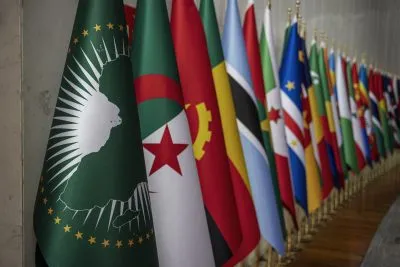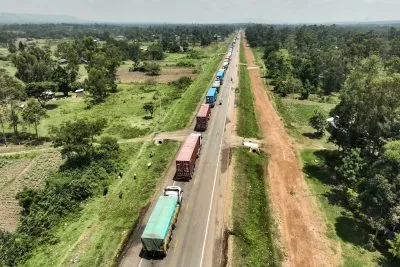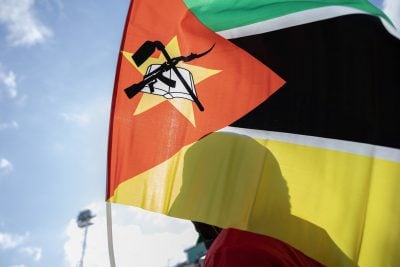The overriding story of Mozambique’s Moza Banco has been one of overcoming and then triumphing over adversity. The bank started brightly, beginning operations in 2008, and by 2011 had been ranked by Banker magazine as the fifth fastest-growing bank in relation to assets in Africa. In 2015, it won the African Banker Award as the Most Innovative Bank in Southern Africa.
But the good times came to an abrupt halt and following a series of poor results, the Central Bank appointed a Provisional Board of Directors to set out a recovery programme.
Following a series of recapitalisations and the entry of major shareholders, the bank today has recovered to become one of the largest in the country. For the last two years it has won the African Banker Award for Best Regional Bank in Southern Africa.
CEO João Figueiredo discusses banking and the wider economic situation in Mozambique with African Banker editor Anver Versi.
Despite a very challenging global and domestic environment, the bank managed to turn a loss of 776m meticals ($12.2m) in 2019 to a profit of 146m meticals ($2.3m) in 2020. Congratulations. How did you achieve this?
In spite of some very difficult circumstances, which were felt by all sectors of the economy throughout the whole of 2020, Moza Banco has followed the same consistent path it had embraced over the last few years – and this is the reason behind the strong upward trend.
The bank has been able to maintain its record of recovery and growth, which is down to the confidence that both consumers and the market are showing in our activity and our performance. One example of this can be seen in the bank’s growth indicators over the course of 2020: assets are up by 14%, resources are up by 20%, and there has been a small growth of 1% in the bank’s loan portfolio.
You can clearly see the bank’s strategic trajectory in the fact that it passed its breakeven point in 2020. This came just three and a half years after the thorough restructuring of its operations, finance and capital structure, all of which was undertaken after the intervention on the part of the Central Bank.
In 2020, not only did Moza Banco manage to maintain its substantial market shares – 6.1% in assets, 6.1% in deposits, and 10.3% in credit – but it also achieved a net profit of 146m meticals ($2.3m).

In March, you issued a bond loan by private subscription of $7.5m. What is the purpose of this?
In 2019, Moza Banco approved its strategic plan for the period from 2019 to 2023. The goal here is to develop a closer relationship with the corporate segment, to better understand the needs of clients’ business, and to promote the positioning of Moza Banco’s products and services within these business needs.
The most immediate part of the strategy is to push specific products aimed at this segment, such as trade finance, factoring, guarantees, bancassurance, forex and the like.
Moza Banco issued the bond loan with direct and private subscription through its shareholder ARISE, BV. This was to reinforce and strengthen its liquidity in foreign currency, putting the bank in a stronger and more balanced financial position in order to cover these activities.
Mozambique has been hit by a triple whammy: the pandemic, terrorism and a faltering economy. How has this affected daily life and business in the country?
The National Institute of Statistics shows that all economic sectors were hit by the state of exception put in place to try and contain the Covid-19 pandemic. This significantly affected society as a whole, with companies closing and employment falling as a result.
The Institute carried out a survey among managers of 89,385 private companies, which it published in June 2020. It found that 90.4% of companies had already been affected by the pandemic, with around 41% in global revenue loss.
The survey also showed that only 20.9% of the companies that responded were given some kind of tax break or social security payment holiday by the government. This shows the needs for the government to make further efforts in channelling material support to companies affected by the pandemic.
These challenges led to 2020 witnessing the first economic recession in Mozambique since 1986. GDP trended downwards at -1.28% in 2020, a situation that was exacerbated by the insurgent attacks that took place around Palma in Cabo Delgado and the subsequent halt in construction work on support infrastructure for future natural gas exploration by Total E&P.
According to the United Nations, military conflicts in Cabo Delgado have led to around 700,000 people being displaced – and 46% of them are children.
In its most recent report, the World Economic Outlook, published in April 2021, the International Monetary Fund revised its forecast for Mozambique’s 2021 economic growth from 2.1% down to 1.6%.
At around the same time, the Government of Mozambique released its medium-term fiscal scenario for the 2022–2024 period, which predicts economic growth of 1.5% for 2021, compared to the previous forecast of 2.1%.
Last year you signed the Enterprise Fund for Portuguese Cooperation (Fundo Empresarial da Cooperação Portuguesa [FECOP]) to help mitigate the effects of the pandemic. Has it been working?
As a financial institution committed to the country’s growth, Moza Banco didn’t need to think twice about joining the FECOP initiative. The initiative is a financial instrument established jointly by the governments of Portugal and Mozambique in order to support micro- small- and medium-sized Mozambican companies.
It seeks to strengthen economic activity and help businesses to recover, particularly in sectors affected by natural disasters and the pandemic.
The impact of Moza Banco joining the initiative has been felt gradually, with requests for financing being received within the framework of the initiative, in particular from SMEs in the agribusiness sector.
This is no surprise since this sector tends to be one of those that struggles most to provide the kind of concrete guarantees that the Central Bank requires.
Nevertheless, the approval processes need to be faster. The current procedure not only requires the bank to approve funding under the FECOP initiative, but the approval then has to be endorsed by a committee within the FECOP before the financing can proceed, which has delayed payments on some occasions. This is normal at the start of initiatives like this, and procedures tend to speed up over time.
To summarise, this is a tool that Moza Banco can use to finance SMEs at a subsidised interest rate and with more generous grace periods. Similar initiatives are needed and would be gratefully received.
The pandemic has forced most banks to change their traditional approaches towards customers. What changes have you had to make?
The bank wanted to be at the forefront of efforts to mitigate the effects of the pandemic by setting concrete measures, and by creating two working groups to respond to operational and financial challenges.
The first working group dealt with operational issues, such as adopting suitable measures and ensuring continuity of the bank’s operations.
The second working group was responsible for mitigating potential risks arising from customers being unable to service their debts by identifying sectors that would be resilient to the effects of the pandemic and by continually monitoring customers assessed as being likely to default. This allowed the bank to offer timely solutions tailored to customer needs.
The bank put in place measures to minimise the impact of the Covid-19 pandemic, such as: relieving some of the financial pressure felt by companies and individuals; continuously disseminating information to our employees, customers and the general public; strengthening the cleaning and disinfection procedures for our offices, branches, ATMs and kiosks; making hygiene and disinfection products available throughout all of our branches; making wearing a mask compulsory for all our employees when dealing with customers, as well as using gloves when handling bank notes.
As part of its ongoing search for solutions to set it apart in the eyes of its customers, Moza Banco has invested in the use of WhatsApp for communicating with customers. Customers can use WhatsApp for consultations, transfers, searches and other useful day-to-day operations. They can also use it to send their personal documents to the bank for updating.
The bank’s investment in this channel is another answer to the current pandemic situation, as it offers customers an alternative way to access the bank.
One thing that sets Moza Banco’s use of WhatsApp apart is that it is also available for non-customers, who can use a range of features such as contacting Moza directly in order to become a customer, downloading the product brochure and consulting with Moza agencies.
The lockdowns have taken a toll on all enterprises but the SME sector has been hardest hit. How is your bank trying to help this sector – for example, are you reviewing your interest rate policies?
Moza Banco continues to view SMEs as the keystone of the national economy. In 2020, the bank ranked fourth in volume of credit to the sector, which shows our commitment towards helping the economy grow.
In order to continue supporting these customers, the bank made special credit lines available, such as SUSTENTA and the Food Security Fund, which aimed to ensure continuity for their business. The bank has also implemented the following measures:
The FECOP credit line aimed at companies hit by Cyclone Idai and Covid-19; the Moza Business POS credit line; support plans for customers engaged in imports and exports and a service plan for World Bank suppliers. In summary, this is a set of initiatives aimed at supporting and stimulating business development for SMEs.

Given Mozambique’s massive natural resources – gas, coal, fishing grounds to name a few, it is often referred to as the ‘sleeping giant’. What needs to be done to wake it up to its full potential?
At the end of the 90s and the turn of the millennium, aluminium was the country’s main source of export revenue. That’s no longer the case, and this is thanks to gradual establishment of economic policies geared towards bringing new investors into the country’s most diverse economic sectors.
This includes not only mining, which already represents the country’s largest source of export revenue, but also agriculture, with significant investments being made in tobacco, cotton and the production of a huge variety of foods, for example.
As such, it is important for economic policies to continue to foster a secure and favourable environment that encourages private investments to enter and remain in the economy.
There are some temporary obstacles that need to be removed in order for the economy to continue to plough ahead. We believe that, as soon as the unrest in the north of the country can be overcome and we return to a stable, post-Covid situation, there is a real opportunity for implementing our multi-sector development model.
Although global trade and movement is slowly returning to normal, it seems there is still some time to go before the all-clear. How can Mozambique best prepare for full economic resumption?
First, it’s important to stress that Mozambique’s state budget is in deficit. International support provided through Mozambique’s cooperation partners is therefore extremely crucial in order for the country to decisively deal with the many challenges it faces with respect to the pandemic, armed conflicts and natural disasters, and to be better able to stimulate sustainable economic activity.
Secondly, the country needs to launch a robust and comprehensive vaccination campaign to combat Covid-19. With a wide rollout of vaccination, current restrictions could be relaxed, which would in turn stimulate economic activity in the country and its relations with its economic partners. We have seen the Mozambican government receiving additional support funds to tackle the challenges the country currently faces.
The World Bank, which is one of Mozambique’s strategic development partners, approved a financing package of approximately $800m on 27 April. $700m of this came through the Prevention and Resilience Allocation instrument, which has the objective of preventing escalation of the conflict and helping to make the country more resilient.
The remaining $100m was channelled through the International Development Association and aims to support the Northern Mozambique Crisis Recovery Project, which focuses on providing an emergency response for people in the villages affected by the conflict.
The World Bank also ensured that additional funds would be available to support vaccination campaigns that are currently underway in Mozambique.
In addition to this, the European Union has stated that it is available to assist in development partnerships, humanitarian action, and cooperation in peace and security matters.
Lastly, it is the role of the government to make sure that the resources that international partners have pledged are channelled to priority areas so that the economy can recover more quickly.
Since 2014, the bank has been on a rollercoaster ride but the last few years have been good and you have won international awards. Does this point to a period of sustained growth?
Implementing the strategy approved by the shareholders allowed us to strengthen our strategic and commercial position. Throughout recent years, the bank has consolidated its position within the domestic financial system, making its way into the list of the five biggest banks operating in Mozambique, with a significant market of 6.1% in assets, 10.3% in credit and 6.1% in deposits.
During this period, the bank determined that recovery and an increase in customer confidence should be a priority for commercial action. Against this backdrop, the bank made significant efforts to mobilise all of its staff, in particular the commercial teams, seeking to ensure the commitment and confidence of all personnel in achieving the bank’s objectives.
On the other hand, it’s worth noting that Moza Banco’s recovery has also been supported by investment in sustainable business development. This has included implementing solutions to set the bank apart, and establishing strategic partnerships to extend its presence, both physical and virtual.
The bank was awarded the prestigious Best Regional Bank – Southern Africa award, which is a recognition of the bank’s efforts over the last few years, in particular in 2020, when the bank showed extraordinary progress in commercial activity indicators, significantly expanded its network, notably in areas without pre-existing bank branches, and increased the quality of its services.
Moza Banco’s geographical expansion has helped it to positively impact the lives of people in remote parts of the country, and thereby to live up to its role as a truly Mozambican bank, and one that prides itself on contributing to the economic progress in the country and the region as a whole.
What are the greatest challenges you have faced and continue to face at the bank?
The bank has already had to deal with a number of challenges and has put itself on the right track with some issues, notably the overdue loan portfolio that was highlighted in the intervention by the Bank of Mozambique in September 2016.
The direct and indirect effects of the pandemic are unquestionably the greatest issues faced by the global economy, and Moza Banco is no exception to this. Nonetheless, despite the pandemic being front and centre and it having such importance on the global stage, it should be noted that it was not the only hurdle Mozambique had to overcome over the course of the year.
It’s important to remember that the country has not yet fully recovered from Cyclone Idai and Cyclone Kenneth, which laid waste to the central and northern parts of the country in 2019, and this weather cycle would unfortunately be repeated with similar phenomena occurring in 2020.
The success of the bank’s strategy is already in evidence in how it has managed to reach its breakeven point. However, the current pandemic situation brings with it a number of uncertainties and difficulties. There can be no doubt that, through its strategy, Moza Banco seeks to ensure stability, and this is what it has done.
However, in closing, I want to stress that our biggest challenge is to put into practice our new DNA as a bank that builds relationships. For us, the bank of the future will be one that focuses on its relationship with the customer.
Our roadmap to excellence and our performance will be based around the framework of how we relate to our customers, how we understand their needs, and how we create products and services that match their needs. We are entering a new era, a time in which the road ahead will be built side by side with our number one partner: our customers!
Want to continue reading? Subscribe today.
You've read all your free articles for this month! Subscribe now to enjoy full access to our content.
Digital Monthly
£8.00 / month
Receive full unlimited access to our articles, opinions, podcasts and more.
Digital Yearly
£70.00 / year
Our best value offer - save £26 and gain access to all of our digital content for an entire year!
 Sign in with Google
Sign in with Google 



